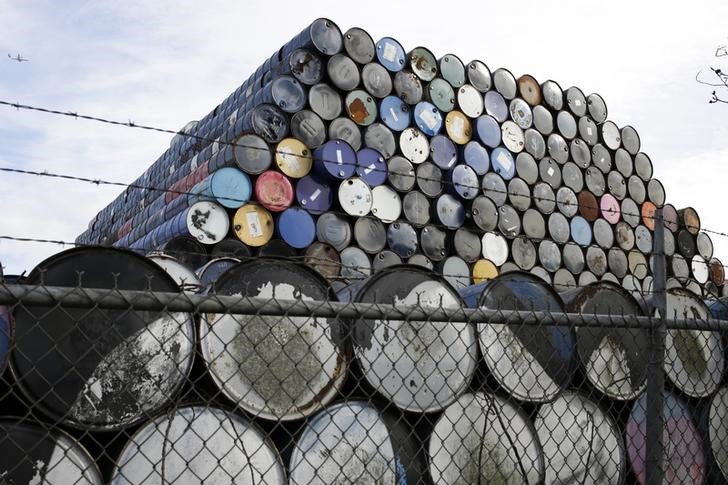Investing.com - West Texas Intermediate extended losses in North American trade on Wednesday, falling more than 1%, after data showed that oil supplies in the U.S. registered a larger-than-expected inventory draw, though gasoline and distillate stocks both registered an unexpected build.
Crude Oil WTI Futures for October delivery on the New York Mercantile Exchange fell 57 cents, or 1.23%, to trade at $45.58 barrel by 10:41AM ET (14:41GMT), compared to $46.19 before the release.
The U.S. Energy Information Administration said in its weekly report that crude oil inventories fell by 5.392 million barrels in the week ended August 25. Market analysts' had expected a crude-stock drawdown of 1.908 million barrels, while the American Petroleum Institute late Tuesday reported a 5.78 million barrel decline in stockpiles.
Supplies at Cushing, Oklahoma, the key delivery point for NYMEX crude, increased by 0.689 million barrels last week, the EIA said. Total U.S. crude oil inventories stood at 457.8 million barrels as of last week, according to the press release, which the EIA considered to be “in the middle of the average range for this time of year”.
The report also showed that gasoline inventories unexpectedly increased by 0.035 million barrels, compared to expectations for a draw of 0.989 million barrels, while distillate stockpiles also rose by 0.748 million barrels, compared to forecasts for a decline of 0.846 million.
Elsewhere, on the ICE Futures Exchange in London, Brent oil for November delivery turned lower and traded down 54 cents, or 1.05%, to $51.12 by 10:42AM ET (14:42GMT), compared to $51.38 before the release.
Meanwhile, Brent's premium to the WTI crude contract remained unchanged from the close late Tuesday at $5.22 a barrel by 10:44AM ET (14:44GMT).
Elsewhere on Nymex, gasoline futures for October delivery fell 3.5 cents to $1.657 a gallon, while October heating oil rose 1.7 cents to $1.671 a gallon.
Natural gas futures for October delivery fell 5.4 cents to $2.929 per million British thermal units.
Energy markets have been rocked this week by the impact of Hurricane Harvey in Texas.
Some refiners in Corpus Christi that shut down ahead of the storm were looking to restart, but heavy rains were expected to last through Wednesday, adding to catastrophic flooding.
The National Weather Service said the storm has set a rainfall record for tropical cyclones in Texas.
But even refineries that are able to restart may experience difficulties getting enough oil supplies.
Ships carrying oil are still unable to enter Texas ports, while producers in south Texas who shut down operations are only starting to ramp up and some pipelines that carry supplies to refineries are still shut.
The bearish reaction seen in oil prices this week was due to the fact that the historic storm has driven down demand.
Although it may appear to be a paradox, those same closed refineries are one of crude oil’s biggest buyers, and according to calculations from Goldman Sachs (NYSE:GS), the closures mean that approximately 3 million barrels a day are not refined into gasoline and other products, far more than the drop in oil production itself.
